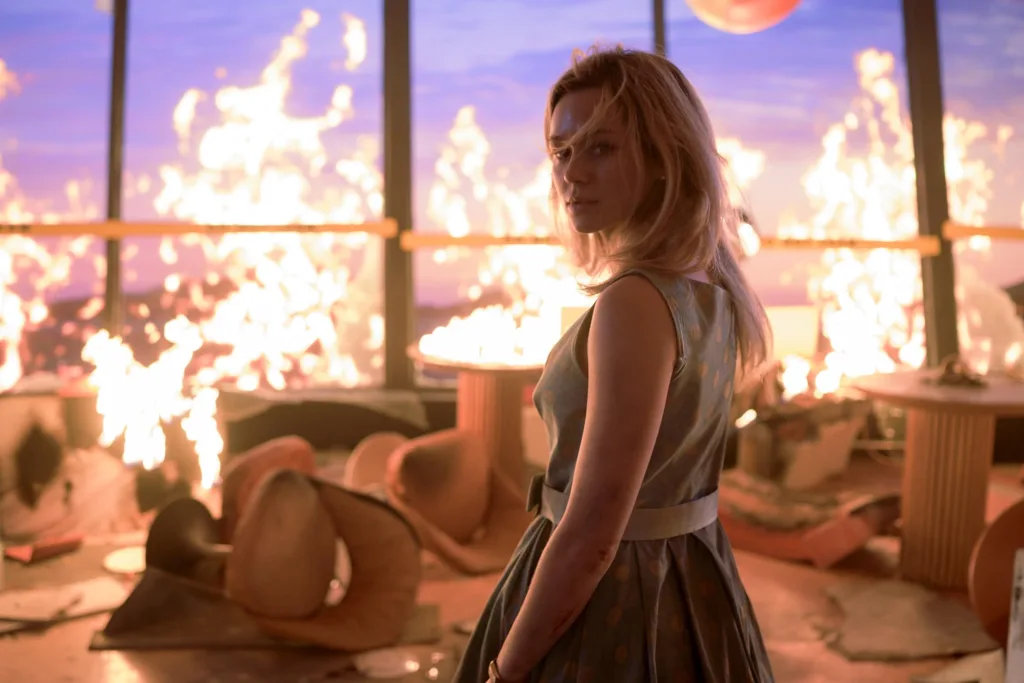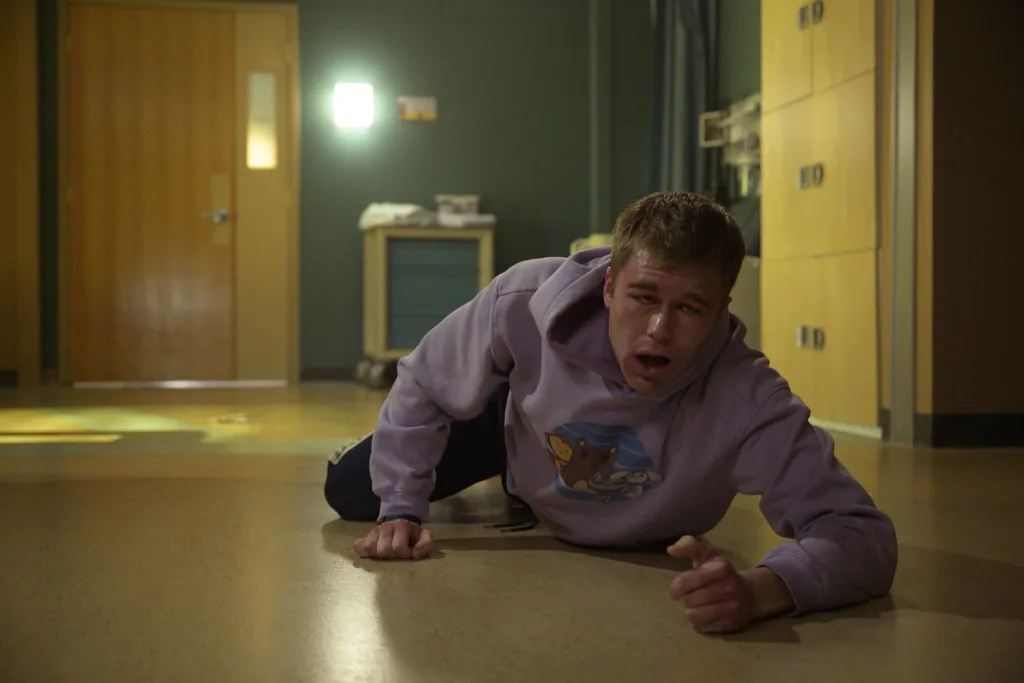The universe, it seems, possesses a rather grim accountant, one with an unyielding penchant for balancing the books on human existence, especially for those audacious enough to smudge an entry. This meticulous, if macabre, ledger-keeper makes a grand re-entry after what feels like an eon in the rapidly decaying memory of pop culture (fourteen years, to be precise, an entire epoch in cinematic terms) with Final Destination: Bloodlines.
This is the sixth chapter in a saga dedicated to the proposition that Death is not merely an event but an artist of baroque, Rube-Goldbergian catastrophe. This time, the unseen force’s attention narrows, with an almost aristocratic focus, from the randomly fortunate to a specific lineage, a family tree whose every branch is marked for an exceptionally creative pruning. One anticipates a familiar canvas of visceral terror, splashes of uncomfortable mirth, and fatality sequences of a truly… imaginative bent.
The film arrives not as a mere echo of its forebears but with aspirations to graft new, perhaps thornier, branches onto the established trunk of its mythology. Central to this is the notion of inherited doom, a ‘death-debt’ passed down through generations, a concept that certainly gives one pause regarding the less tangible, though equally potent, legacies we all carry.
Ancestral Accounts Due: The Architecture of Inherited Annihilation
The primary narrative recalibration in Bloodlines—and it is a significant one—sees Death trade its scattergun approach for something akin to genealogical sharpshooting. No longer content with merely tidying up after localized temporal anomalies, the force now pursues an entire family tree, each member a pre-destined debtor on an ancestral ledger.
The title, “Bloodlines,” is thus not merely descriptive but prescriptive, hinting at a fatalism woven into the very fabric of heredity, a kind of anti-eugenics where survival itself becomes the damning aberration. One might ponder if this reflects a societal shift, a subconscious grappling with the long-term consequences of past actions rippling through subsequent generations, a far more grim take on “the sins of the father.”
This hereditary vendetta finds its wellspring in a prologue drenched in the aesthetics of a bygone, somewhat temporally muddled, era (are we in the jet-set early sixties, the earth-toned seventies, or some saccharine fifties echo chamber? The diegetic jukebox seems equally confused, offering a smorgasbord of period-appropriate, yet chronologically promiscuous, needle drops).
Here, a young woman named Iris (Brec Bassinger, embodying a certain wide-eyed optimism soon to be comprehensively shattered) experiences the franchise’s foundational trauma: a premonition of catastrophic failure at the grand opening of the Skyview restaurant—a name almost comically aspiring given its imminent, spectacular descent. Amidst the forced gaiety of an observation deck soirée, fueled by The Isley Brothers’ “Shout” (a command the structure itself seems poised to obey in the most literal, destructive sense), Iris foresees the carnage.
The sequence itself is a carefully constructed crescendo of dread, a testament to the grim potential lurking beneath any veneer of celebratory normalcy, each potential hazard highlighted with an almost fetishistic attention to detail. This, then, is the poisoned well from which all subsequent familial misfortune flows; the original sin of survival.
Flash forward several decades, and Iris’s granddaughter, Stefani (Kaitlyn Santa Juana), finds herself the unwilling inheritor of these spectral replays, her sleep regularly invaded by visions of the Skyview’s implosion. Her quest to decipher these night terrors unearths the family’s rather unique ‘skeleton in the closet’—an intergenerational IOU to the Reaper.
The film gestures, however fleetingly, towards the notion of generational trauma, the idea that the unaddressed horrors of the past don’t just haunt, they actively hunt. It’s a tantalizing thread, this psychological haunting prefiguring the literal one, though perhaps not explored with the depth it might warrant, functioning more as thematic seasoning than the main course.
As for the unraveling of this fatalistic tapestry, the narrative does not overly indulge in protracted mystery. The “why” of Stefani’s visions and the link to the ancestral catastrophe are laid bare with a certain narrative expediency, choosing perhaps to focus its energies less on the whydunit (a question to which the answer is always, simply, ‘Death’) and more on the elaborate, impending ‘how-they-gonna-get-it.’
The Abattoir Ballet: Calamity by Design
The true spectacle of any Final Destination entry, its grisly raison d’être, lies in the intricate choreography of its ‘accidents’—less acts of God, more the diabolical tinkerings of a cosmic sadist with a PhD in applied physics and an unhealthy appreciation for Buster Keaton’s more perilous stunts. Everyday paraphernalia (a loose screw, a spilled drink, a precariously balanced object) become the unassuming first dominoes in a cascade of ‘mortis mechanics,’ leading to an often comically grotesque demise.
There’s a perverse delight in this transformation of the mundane into the murderously malevolent; your morning coffee machine could, in this universe, be plotting your elaborate end. It is, perhaps, a reflection of a latent societal anxiety, the fear that the complex, interconnected systems of modern life are inherently fragile, perpetually on the verge of catastrophic, and frankly absurd, collapse.
The Skyview restaurant disaster, revisited from its initial premonition, sets a high bar with its symphony of structural failure, immolation, and the almost cartoonish (yet still wince-inducing) impact of a grand piano fulfilling its gravitational destiny with aplomb. In the present, Death’s ingenuity remains undiminished: a humble lawnmower becomes an instrument of brutal suburban reckoning; an MRI machine, typically a window into the body, becomes a magnetic vortex of doom (a particularly resonant sequence, playing on contemporary anxieties about the very technologies designed to sustain, or at least diagnose, us); even the banal threat of a garbage truck or the edgy cool of a tattoo parlor are reimagined as arenas for elaborate obliteration.
The genius, if one can use such a term for such macabre orchestrations, often lies in the misdirection, the feints and dodges that toy with our expectations of who is next on the chopping block, and how ludicrously they will meet their end. The ceiling fan, that old cinematic harbinger of unease, naturally gets its moment, as does the ominous potential of “Trash Day.”
Visually, these set pieces are brought to life (or rather, un-life) through a commingling of goopy, tangible practical effects—which retain a certain stomach-churning authenticity—and the slicker, sometimes less convincing, sheen of digital augmentation. The destruction of the human form is rendered with an unblinking, almost anatomical explicitness: bodies are impaled, crushed, bisected, and generally disassembled with a glee that borders on the celebratory. Not every splatter hits its mark with equal aplomb, some CGI feeling a tad too weightless for the on-screen carnage, but the commitment to visceral impact is rarely in doubt.
This is where the series embraces its peculiar brand of ‘splatterstick,’ a term one might coin for its fusion of graphic horror and physical, almost slapstick, comedy. Suspense is meticulously engineered, each potential hazard telegraphed with agonizing slowness before the inevitable, explosive release. One can almost hear the collective intake of breath in the cinema, followed by a shocked laugh or a groan of appreciative disgust—a communal experience of dread and relief, served with a side of arterial spray. It’s a ritual, of sorts.
Pawns on a Pathological Chessboard: Humanity Against the Inevitable
In a narrative so overwhelmingly orchestrated by an unseen antagonist, the human figures often risk becoming mere reactive elements, pins in Death’s elaborate bowling alley. Stefani Reyes, portrayed by Kaitlyn Santa Juana with a commendable (and necessary) frazzled tenacity, shoulders the burden of the contemporary Cassandra, attempting to decode the ancestral curse while keeping her kin from becoming gory statistics.
Her character, while not plumbing profound psychological depths (a common casualty when your co-star is an abstract concept), serves as the audience’s anchor in the swirling chaos, an everywoman tasked with understanding a malevolence that defies everyday logic. A subplot involving an estranged mother adds a flicker of domestic drama, though it, like many personal lives here, is swiftly overshadowed by the more pressing matter of imminent, inventive annihilation.
Young Iris, played with an affecting vibrancy by Brec Bassinger in the prologue, is the unwitting progenitor of this generational affliction, her survival a defiant act that ripples outwards with devastating consequence. Her elderly iteration, Gabrielle Rose channeling a delightful ‘hermit-chic’ preparedness in her (ultimately porous) Death-proof bunker, embodies the weary wisdom and perhaps defiant eccentricity of one who has lived too long with a bullseye on her back, a performance teetering on the edge of delightful camp. She knows the rules of this terrible game, even if her countermeasures prove futile.
The extended family are a collection of individuals bound by blood yet often distanced by familiar frictions—a microcosm, perhaps, of any clan forced to confront an existential threat with varying degrees of denial and wit. Richard Harmon’s Erik stands out, injecting a welcome current of snark-laced sentimentality, a sort of cynical chorus who nonetheless cares, his dialogue often providing the sharpest barbs.
Others, like Owen Patrick Joyner’s affably clueless Bobby, fulfill their roles as ‘calamity-fodder’ with a certain endearing obliviousness; indeed, some characters navigate their precarious existence with a level of incaution that borders on the artistically stupid, a necessary trait, one supposes, for Death’s Rube Goldberg machines to function optimally. They are less fully fleshed beings and more intricately carved game pieces, set up for spectacular removal from the board.
Then there is William Bludworth. Tony Todd’s return as the sepulchral coroner, a figure who seems to possess a disturbingly intimate understanding of Death’s rulebook, is rendered profoundly poignant by the knowledge that this was among his final screen appearances before his passing. His single scene, reportedly an improvised monologue on the preciousness of fleeting time, transcends its narrative function.
Framed with an almost eulogistic grace, Todd, looking frail yet radiating an undiminished gravitas, appears to address not just the terrified characters before him, but us, the viewers. It is a moment of unexpected emotional resonance, a meta-commentary on mortality delivered by a beloved genre icon, lending a weight to the film that its otherwise gleefully morbid proceedings might not achieve on their own. A true grace note in a symphony of splatter.
The Conductors of Carnage: Orchestrating Death’s Design
Behind the lens, Zach Lipovsky and Adam B Stein approach this resurrection of a dormant franchise with palpable, infectious enthusiasm. Their task is a curious one: to lend a certain cinematic polish while reveling in material that inherently delights in its own splattery, knowingly absurd premise. The result is a directorial style that feels both inventive and assured, a kinetic flurry of images clearly indebted to the gleeful, almost balletic, mayhem of early Sam Raimi. There is a confidence here that allows the inherent silliness to breathe without undermining the visceral jolts.
Visually, the film operates on what one might term ‘anticipatory dread by design.’ Each frame in the elaborate death sequences seems meticulously calibrated to highlight potential threats, turning the mundane into a landscape of imminent peril.
The camerawork is often dynamic, particularly in the dizzying Skyview prologue with its sweeping sense of scale and impending chaos, and thoughtfully composed during Tony Todd’s poignant soliloquy, where the lens seems to grant him a direct, almost conspiratorial, line to the viewer. The aesthetic is one of, to borrow a fitting descriptor, ‘bouncy brutality’—a visual language that acknowledges the horror yet winks with a certain roguish charm at its own preposterousness.
This visual energy is amplified by an editing sensibility one might term ‘constructively cruel,’ particularly as Death’s intricate traps begin to spring. Sequences are often assembled for maximum tension, each cut a turn of the screw, leading to payoffs that are both shocking and, in a grimly satisfying way, inevitable. The overall pacing maintains a commendable briskness, rarely allowing the audience to dwell too long on any one atrocity before teeing up the next, ensuring a quick-witted, propulsive momentum that largely avoids getting bogged down.
The auditory landscape is equally complicit in this dance of death. Beyond a score presumably designed to ratchet up unease, the film deploys its needle drops with a surgeon’s precision and a comedian’s timing. Tracks like The Isley Brothers’ “Shout” become ironic anthems of destruction during the opening calamity, while other selections such as “Raindrops Keep Falling on My Head” or “Ring of Fire” provide a layer of darkly humorous commentary on the on-screen events, transforming cheerful pop into funereal counterpoint or vice-versa.
Indeed, the directors navigate the film’s comedy-forward trajectory with considerable skill. This tonal tightrope walk between genuine jolts, fountains of gore, and outright absurdity is handled confidently, preventing the film from collapsing into mere farce or unrelenting grimness. It’s a delicate balance, this art of making an audience laugh even as they recoil, and for the most part, they maintain their footing.
Death’s Deuterocanon: Canon, Callbacks, and Curses
Navigating the treacherous terrain between reverence and reinvention, Final Destination: Bloodlines liberally sprinkles its path with familiar breadcrumbs for the devoted: the ominous logging truck, the treacherous barbecue, a respectful nod to past survivors (Kimberly Corman, we see you). A newly minted penny totem joins the iconography of arbitrary doom, glinting with malevolent chance.
Whether these nods feel like earned salutes or mere checkbox-ticking often depends on one’s prior immersion in this fatalistic ‘verse. The film certainly deepens its own peculiar theology, presenting an origin for its specific generational curse and imbuing Death with a quasi-superstitious, almost pettifogging, rule set—chronicled in Iris’s almost biblical guide to (temporarily) not dying.
This prequel/sequel architecture, a familiar gambit for enduring sagas, aims to welcome new acolytes while reassuring the old guard that the core tenets of calamitous creativity remain. Its most significant canonical contributions—the hereditary nature of the curse and the initial deferral of the disaster replay—do more than just tweak the formula; they hint at a more intricate, perhaps even more personal, vendetta between Death and its designated defaulters.
This ‘death-lore’ expansion, exploring a more complex and perhaps even superstitious facet of the antagonistic force, coupled with a meta-awareness of its own tropes (via Iris’s extensive notes on Death’s M.O.), makes for an interesting, if sometimes self-conscious, evolution of the series’ grim rulebook.
The Reaper’s Encore: Assessing Death’s Latest Design
Final Destination: Bloodlines undoubtedly delivers on its core, sanguinary promise. The death traps remain baroque marvels of malevolent Rube Goldberg engineering, the dark humor frequently lands with a satisfying splat, and its opening act is a masterclass in escalating dread, a grand overture to the ensuing carnage. Tony Todd’s screen farewell offers a moment of genuine, unexpected grace amid the grotesquerie, and several central performances navigate the stylized terror with commendable commitment, grounding the absurdity just enough.
Yet, for all its kinetic, gory enthusiasm, certain thematic ambitions feel like promising seeds left largely untended. The exploration of inherited trauma, a potentially rich vein for a film titled ‘Bloodlines,’ remains mostly a surface-level suggestion, a whisper of psychological depth in a narrative that overwhelmingly favors the visceral.
Intriguing new rules for Death’s macabre game (the age-ordered culling, for instance, a chillingly bureaucratic touch) are dangled tantalizingly before being unceremoniously swept aside, perhaps deemed too restrictive for the freewheeling invention of the kills. Minor character threads, like Stefani’s maternal estrangement, flicker briefly before being extinguished by the larger, louder conflagration of fate.
Ultimately, this sixth installment stands as a robust, if not paradigm-shifting, affirmation of the franchise’s peculiar, grisly charm. It’s a gleefully over-the-top ballet of the body count, a testament to the simple, enduring power of watching elaborate, unrepentantly silly mechanisms enact our most cartoonish fears. Death, it appears, is still very much the life of this particular, splatter-soaked party, proving the formula, when executed with such bloody enthusiasm, retains its power to entertain and unnerve.
Full Credits
Directors: Zach Lipovsky, Adam B. Stein
Writers: Guy Busick, Lori Evans Taylor
Story by: Jon Watts, Guy Busick, Lori Evans Taylor
Producers: Craig Perry, Sheila Hanahan Taylor, Jon Watts, Dianne McGunigle, Toby Emmerich
Cast: Kaitlyn Santa Juana (Stefani Reyes), Teo Briones (Charlie Reyes), Richard Harmon (Erik Campbell), Owen Patrick Joyner (Bobby Campbell), Anna Lore (Julia Campbell), Rya Kihlstedt (Darlene Reyes), Gabrielle Rose (Iris Campbell), Brec Bassinger (young Iris Campbell), Tony Todd (William Bludworth), Max Lloyd-Jones (Paul Campbell), Tinpo Lee (Marty Reyes), April Telek (Brenda Campbell), Alex Zahara (Howard Campbell), Brenna Llewellyn (Val), Yvette Ferguson (Mrs. Fuller), Mark Brandon (Mr. Fuller)
Director of Photography (Cinematographer): Christian Sebaldt
Editor: Sabrina Pitre
Composer: Tim Wynn
The Review
Final Destination: Bloodlines
Revitalizing a dormant franchise, Final Destination: Bloodlines excels in its primary mission: orchestrating a symphony of inventive, darkly comedic demises. Its stylish direction and a truly poignant final bow from Tony Todd elevate proceedings. While its flirtation with deeper thematic resonance concerning inherited fate remains somewhat cursory, leaving richer veins of psychological horror unexplored, the film delivers a gleefully macabre spectacle. This is a meticulously crafted, if not profoundly revolutionary, exercise in high-concept splatter, proving Death's design still holds a grim, captivating allure.
PROS
- Inventive, darkly comedic death sequences remain a highlight.
- Strong, stylish direction elevates the franchise's signature mayhem.
- Impressive opening disaster set piece.
- Tony Todd's final appearance provides genuine poignancy.
- Effectively blends horror with a gleefully macabre sense of humor.
- Engaging expansion of the series' "death-lore" and rules.
CONS
- Deeper thematic explorations (e.g., generational trauma) feel underdeveloped.
- Some intriguing plot points or rules are introduced then quickly sidelined.
- Characterization beyond the protagonists can be thin.
- Certain digital effects occasionally lack weight.





















































